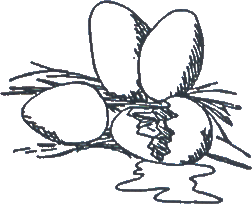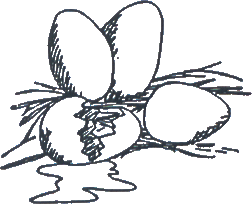 |
Eggs |
 |
Marieke van Dal always sends us interesting questions, most of which become articles sooner or later. Her latest was about eggs. She wrote: "I wonder if you could perhaps shed some light on a question that's been bothering me--the seasonal availability of chicken eggs. We take year-round eggs for granted-- but isn't that a result of breeding and artificial light? Perhaps egg-leavened cakes and omelets were only available in the spring? And yet eggs, I believe, were not eaten during Lent, being considered as meat..."
Recipes for eggs abound in Roman and medieval cookbooks, so they must have been widely available for longer than a few short weeks in spring. In William Vaughan's Directions for Health, 1617 (I hate to use late period sources, but some things just didn't seem to have interested the Romans!) he writes: "Likewise it hath been noted that Eggs layed after the new of the Moone, in the Moneth of August or in the wane of the Moone, in the Moenth of November, as those likewise which are layed about Christmasse or Witisontide, are lasting and durable and not easily corrupted.” So, they had eggs all year long, or at least most of the year.
When I was a child we often visited my Great-Aunt Myrtle who lived in the country. I remember gathering eggs all summer long. I think the deal goes like this: as long as you keep removing the eggs from the nest, chickens “forget" they laid any and keep on going. Wild birds do the same thing--the justification used by ornithologists for removing eggs from the nest for experiments or collections. Some hens are allowed to hatch their clutch, but as soon as the chicks are grown, the hens begin to lay again. I think the artificial lighting is to increase production by fooling the hens into thinking it is summer and/or daylight all the time.
Previous Article |
Next Article |
Back to Early Period #15 index
Back to Early Period Index |
Back to PastTimes



